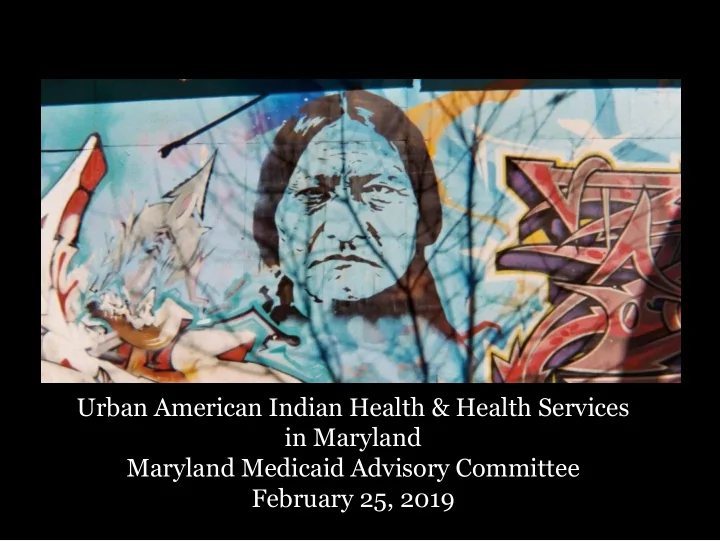

Urban American Indian Health & Health Services in Maryland Maryland Medicaid Advisory Committee February 25, 2019
Native American Lifelines is a Title V Urban Indian Health Program funded by the Indian Health Service. It is the mission of the Indian Health Service to raise the physical, mental, social, and spiritual health of American Indians and Alaska Natives to the highest level.
Our Mission The mission of Native American Lifelines is to promote health and social resiliency within Urban American Indian communities. Native American Lifelines applies principles of trauma informed care to provide culturally centered behavioral health, dental, and outreach and referral services.
Who We Serve Baltimore • Baltimore-Columbia- Towson MSA • Maryland MSAs • State recognized tribes in MD/DE/VA • Tribal citizens residing in MSAs • Descendants of State or Federal tribal members
Services Provided Baltimore • behavioral health services / telebehavioral health • medical case management (including purchase of care referrals) • health promotion /disease prevention activities • general dentistry • youth & family programming • *new* Family Spirit Program • transportation services • resource workshops & health fair events • prison outreach • community outreach & cultural supports
Our Team Kerry Hawk Lessard , MAA (Shawnee): Executive Director Dustin Richardson, LCPC (Blackfeet): Clinical Director Jess McPherson , CACS (Shawnee): Fiscal Manager Jessica Dickerson (Lumbee): Medical Case Manager Christopher Simmons: Transportation Coordinator Tavi Hawn, LCPC (Cherokee): Contracted Mental Health Clinician Shelly Wiechelt, PhD: Contracted Substance Abuse Treatment
Who is an Urban Indian? Urban Indians are tribal members or descendants who are currently living outside of federally-defined tribal lands in U.S. cities. • government policies that forced relocation in the 1950s • termination policies that forced assimilation into Non- Native culture For Urban Indians in particularly, and the termination policies that forced assimilation into Non-Native culture, have had long- term health consequences.
History of Urban Indian Health Services • 1950s – 1960s: B.I.A. relocated over 160,000 AI/AN to selected urban centers across the country. • late 1960s: community leaders advocate for culturally appropriate health programs for AI/AN • 1966: pilot UIHP in Rapid City, SD • 1973: Congressional study of unmet needs in Urban AI/AN community in Minneapolis, MN > appropriate funding under Snyder Act of 1924 • 1976: Indian Health Care Improvement Act (PL.94-437) • Title V: direct medical services, alcohol services, mental health services, HIV services, health promotion, and disease prevention services
Location of Residence (U.S. Census Bureau, 2010) By Percent 29% 71% Non-Urban Urban AI/AN
American Indians in Baltimore, MD (U.S. Census Bureau, 2010) AI/AN alone: 2,270 AI/AN in combination: 3,591 0.37% of total population Median age: 35.6 Total Under 18: 498 Majority tribe(s): Cherokee*, Lumbee * by self-report
2016 Indian Health Service Budget By Percent 4% 1% 4% 91% Clinical Preventative Other Urban Indian Health
Urban American Indians - 20.3% of Urban Indians live in poverty compared with 12.7% of urban population in general - profound health disparities (DM, cancer, cardiac disease, SA/ETOH abuse, mental distress, etc.)
Figure 1: Population Under 65 with No Health Insurance Coverage, 2010-2014 Figure 2: Population Under 18 with No Health Insurance Coverage, 2010-2014
Income Below the Federal Poverty Level in Past Year, Baltimore Service Area, 2010 - 2014
Data matters. “Othering” dehumanizes and impedes our ability to fully understand the health status of Urban AI/AN.
Data matters. Few culturally-specific, evidence-based disease prevention programs exist for American Indians. American Indians are a very small minority group in Baltimore and have received little attention from researchers or providers. Very little epidemiological data exists on risk behaviors in this population. Evidence of rampant racial misclassification in official health, social service, and criminal justice records erases Native people from public health discussions. Focusing on small but high-risk minority communities within a larger metropolis has the potential for large public health impact.
Program Philosophy Trauma Informed Care A program, organization, or system that is trauma-informed: • Realizes the widespread impact of trauma and understands potential paths for recovery; • Recognizes the signs and symptoms of trauma in clients, families, staff, and others involved with the system; • Responds by fully integrating knowledge about trauma into policies, procedures, and practices; and • Seeks to actively resist re-traumatization. (SAMHSA)
Program Philosophy Historical Trauma • cumulative emotional and psychological wounding over the lifespan, across generations, emanating from massive group trauma (Brave Heart & DeBruyn, 1998) • “intergenerational trauma” • “the loss of language and culture that has left so many Aboriginal people bereft of their unique place in the world. It is these disorientations and their psychosocial correlates … that the term [historical trauma] was intended to capture,” (Gone, 2009, 757).
historical trauma health demoting behavioral practices HIV/Hepatitis C/ STIs
Program Philosophy Decolonial Praxis the struggle “to reclaim and regenerate one’s relational place-based existence by challenging the ongoing, destructive forces of colonization.” - Jeff Corntassel
Special Activities National Native HIV/AIDS Awareness Day
National Native HIV/AIDS Awareness Day
Special Activities Health Promotion / Disease Prevention
Special Activities Two Spirit Support
Special Activities Youth Wellness Programming
Special Activities National Projects
Outcomes promoting healthful living
Outcomes remembering our ways
Outcomes promoting sobriety
Outcomes strengthening indigenous identity
Outcomes strengthening families
Outcomes strengthening our community
Native American Lifelines 106 W Clay Street, Baltimore MD 21201 410.837.2258 x.103 kerry@nativelifelines.org
Recommend
More recommend